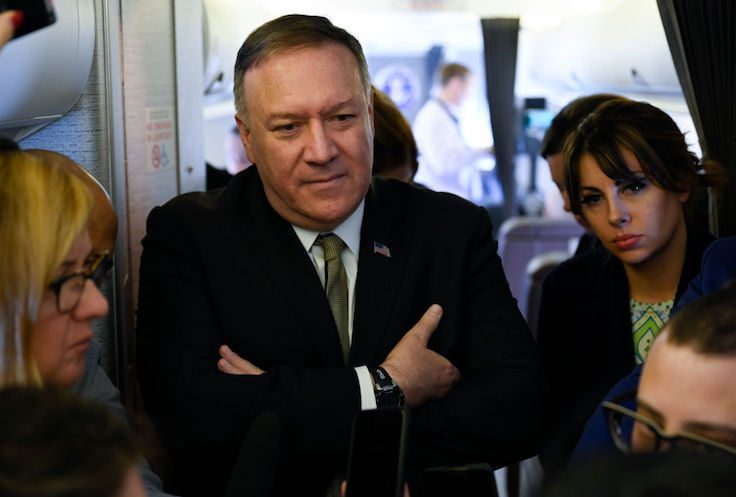Secretary of State Mike Pompeo will spend the next 10 days traveling between Africa and the Middle East for high-level meetings about the ongoing threat posed by Iran, the global outbreak of the coronavirus, and increased U.S. investment in the developing world.
The first leg of Pompeo's trip will bring him to Germany, where he will discuss Western values in a keynote speech at the Munich Security Conference, the country's premier foreign policy gathering. Pompeo will then head to Africa for stops in Angola, Ethiopia, and Senegal. Meetings will focus on African efforts to combat the spreading coronavirus, as well as efforts by the Trump administration to promote American business in these developing countries.
The final leg of the trip will take place in Saudi Arabia and Oman, where Iran's ongoing terrorist operations are likely to dominate the agenda. Pompeo said in response to Washington Free Beacon questions that the focus of his discussions in the region will be on preventing Iran from obtaining a nuclear weapon. Under the so-called maximum pressure campaign instituted by President Donald Trump, administration officials have worked to squeeze Iran economically and pressure the regime into a new round of negotiations.
"There will come a day when the Iranians will conclude that the right thing to do is to reach out to America and find a solution to what the president has as his highest priority, which is to ensure that they don't have a nuclear weapon today, next year, or ever," Pompeo told the Free Beacon on Thursday aboard his plane en route to Munich.
In Saudi Arabia, Pompeo will tour the country's oil fields, which have come under attack by Tehran in recent months. Pompeo said that while the administration's pressure campaign has reduced Iran's ability to launch attacks in the region, it has not eliminated the threat entirely.
"The maximum pressure campaign continues," Pompeo said. "Its impact in terms of denying the resources to the regime to launch missiles into places like we're going to be—we're going to visit the Saudi Aramco [oil] facility—is reduced. It's not zero. They still have resources. But they're having to make more difficult choices about whether to underwrite Hezbollah [or] support the Shia militias in Iraq."
Pompeo said "all of those things become more difficult choices as their resources" run dry due to tough American sanctions.
The Trump administration has deepened the United States's historically close alliance with Saudi Arabia. The kingdom was the sight of the president's first foreign trip in 2017, and Trump, Pompeo, and Trump son-in-law and senior adviser Jared Kushner maintained the alliance as evidence emerged that Crown Prince Mohammad Bin Salman had ordered the murder of American resident Jamal Khashoggi.
While the focus of talks may be on Iran, Pompeo said he also plans to push the Saudis to advance their own adherence to human rights standards.
"We'll also spend a little bit of time talking about our force posture there as well, and then some of the things that we hope the Saudis will continue to do to execute the crown prince's vision by improving human rights in Saudi Arabia as well," Pompeo said.
Pompeo also discussed the progress of high-level peace talks with the Taliban in Afghanistan.
"We have made real progress over the last handful of days," Pompeo said of the discussions.
The ultimate goal, he said, is to get "all the Afghans sitting at a table and finding a true reconciliation" that could pave the way for U.S. forces to finally leave the country after nearly two decades.
Speaking about the rapid spread of coronavirus, Pompeo said the United States is continuing to provide assistance to Africa and other countries endangered by the illness.
"We are concerned there are places without adequate infrastructure," he said, adding that it is immediately necessary to bolster those countries ill-equipped to handle the outbreak.
